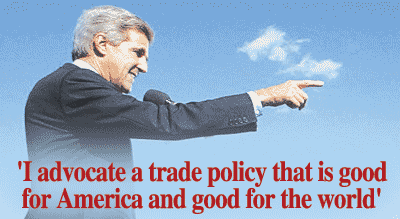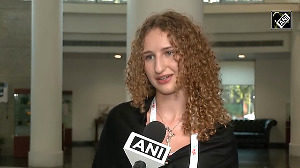
After scoring a scoop with his interview with US President George W Bush -- the only interview the president has granted any South Asian publication -- last month, Aziz Haniffa, National Affairs Editor at India Abroad, the leading newspaper for the Indian-American community owned by rediff.com, scored a unique double last week by interviewing Democratic Presidential candidate Senator John F Kerry.
In an exclusive interview, published in this week's issue of India Abroad, Kerry discussed the Indian-American community's contributions to mainstream America, relations with India and, of course, outsourcing.
Part I: 'I will recognise the vital global role India will play in the 21st century'
Part II: 'Cross-border terrorism must stop. Period.'
The final part of the three-part interview:
Virtually all of your foreign policy advisers have indicated that nuclear and ballistic non-proliferation will be a top priority on your foreign policy agenda and you will resurrect the Clinton administration's top foreign policy priority of the Comprehensive Test Ban Treaty. Does this mean you will encourage India to sign the CTBT?
The CTBT promotes a vital interest shared by America, India, and the rest of the world: stopping nuclear proliferation and preventing nuclear terrorism. The objectives are advanced when as many nations as possible fully embrace international non-proliferation norms and standards. I will work towards that.
Ensuring our safety is about more than just the CTBT. India and the US have a very similar view of the need to implement a comprehensive international approach to preventing the transfer of nuclear materials and know-how to irresponsible governments and terrorists. I will work to strengthen cooperation with India in all vital aspects of non-proliferation. This is where my priorities will lie.
Your unambiguous and unequivocal stand against outsourcing has concerned India and by extension the Indian-American community, which feels it's a case of targeting India as the whipping boy for political expediency even though facts belie the rhetoric. How can you allay these apprehensions?
Your rhetoric have been seized upon by the Republican National Committee and even President Bush says you are anti-free trade and opposed to globalization and nothing but a protectionist at heart.
This is an issue about which some in the community are concerned. There have been misrepresentations of my position on the issue. What I am against is unfair tax laws that practically compel US companies to move operations overseas. I'm against a distorted tax code that rewards business leaders for shutting down American factories and laying off American workers, including those in the Indian-American community. They have been hit particularly hard by job losses in the information technology and medical diagnosis sectors.
Look at my record over two decades
I advocate a trade policy that is good for America and good for the world.
As an advocate of free and fair trade, I will make sure criticism of business practices which harm American workers doesn't generate a backlash against Indian Americans, the same way trade disputes with Japan in the 1980s led to incidents of anti-Asian bigotry.
I have absolutely no use for anyone who uses the outsourcing debate as an excuse to fan flames of intolerance.
Post-9/11, several innocent South Asian Americans and Indian Americans have been racially profiled and subjected to hate crimes. You have come out strongly against Attorney General John Ashcroft and the Patriot Act, arguing it is unconstitutional and un-American. Will you remove some of the draconian measures if elected? How will you remove concerns by Muslims, Arabs and South Asians that they are being unfairly targeted?
One of the great tragedies arising out of 9/11 is the way in which intolerance and discrimination have increased in this great land of ours. The effects of the post-9/11 climate of fear have been particularly severe on the South Asian community. Indian Americans have been targets of vicious slurs, heightened suspicions and even heinous hate crimes.
The victims have included Sikhs and Hindus as well as Muslims. The administration does not appear to think hate crimes represent a serious threat to American values. They are wrong. Such despicable acts have no place in our country.
In the Senate I have been at the forefront of the fight to strengthen hate crimes legislation. I have backed the Workplace Religious Freedom Act, which offers protection to workers from on-the-job discrimination related to religious beliefs and practices. I have supported legislation to end racial profiling. I have worked to provide real remedies for victims of the discriminatory practice.
I believe in an America that is safe and free. As President, I will defend our liberty and our security at home and appoint an attorney general who values and protects civil liberties. Like the eight justices of the US Supreme Court, I have rejected the Bush administration's policy of detaining American citizens indefinitely, without access to a lawyer or chance to prove innocence.
Some provisions of the Patriot Act -- like the money laundering provisions -- must be made stronger. Others -- like the library and 'sneak-and-peek' search provisions -- must be made smarter, to better protect privacy and freedom while allowing our government to do everything necessary to track down terrorists and defend America.
As President, I will ensure the government is open and responsive to the needs and inquiries of Congress and the public, offering enough information to hold the government accountable without compromising security.
Have you read Aziz Haniffa's interview with President Bush?
Photograph: Justin Sullivan/Getty Images
Image: Rajesh Karkera






 © 2025
© 2025